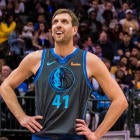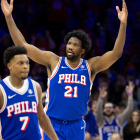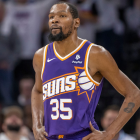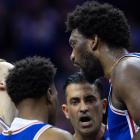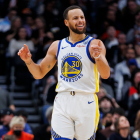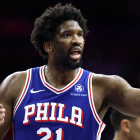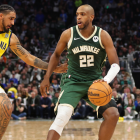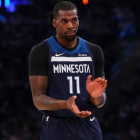Before a Dallas Mavericks practice in January, Dirk Nowitzki lined up for a race with Dennis Smith Jr. The 40-year-old started at halfcourt, the 21-year-old at the baseline.
3 … 2 … 1 … Smith took off. Nowitzki did not.
"He was like, 'Nah, not ready. Not ready. Let's get to practice,'" Mavericks forward Ryan Broekhoff said.
Smith does not buy the idea that Nowitzki wasn't warmed up.
"It took him too long to start," Smith said. "I accelerated quicker than he did. Once he seen that, he looked back. He was like, 'Oh, he's behind me.' He just gave it up. Smart."
The genesis of the race, according to Smith, who is now with the New York Knicks: "He was in the locker room selling woof tickets basically, saying everybody say he moves slow, and this, that and the third. He bet $10,000 in a foot race that nobody will beat him if he starts at halfcourt and they start from full court. So I came in there and I heard. I got wind of it and I took the bet immediately, and of course I won the bet two times. And he ain't pay my money yet. So this summer, I'ma probably go shake him down in Dallas."
Before any summer shakedown, the Mavericks will celebrate Nowitzki's career at their final home game of the season Tuesday. Nowitzki has not officially announced that he intends to retire, but during the stretch run, owner Mark Cuban told CBS Sports, "It's really just starting to hit me that he only has a few weeks left." Dallas will finish things off Wednesday in San Antonio.
Over the course of Nowitzki's 21st season, more than 30 people who have been around him -- current and former teammates, opponents, Mavericks staff -- participated in interviews for this oral history to capture how the superstar from Würzburg made his mark in Dallas and beyond.
"Why do people want my autograph?"
Mavericks general manager Donnie Nelson scouted Nowitzki and coached him at the 1998 Nike Hoop Summit. Nelson saw a "long, tall, skinny German drink of water," and took a liking to his shooting ability and competitiveness. Nowitzki had skipped a playoff game with the DJK Würzburg X-Rays, the second-division team in his hometown, in order to be in San Antonio. It paid off.
"The Hoop Summit, I guess you can call it his American Idol coming out party, where in front of pretty much every GM at the time he erupted and scored 30-plus points," Nelson said. "And did so in spectacular fashion."
Dallas acquired the No. 9 pick in the 1998 draft to select him even though Paul Pierce -- also ranked in the Mavs' top three -- was unexpectedly available. An apprehensive, perhaps even reluctant Nowitzki came to Dallas several months later, at the conclusion of the NBA's lockout. He and third-year guard Steve Nash, acquired in a trade from Phoenix, sported bleached blond hair at their introductory press conference. "I thought a couple members of the Beach Boys got lost," Nelson said.
Greg Buckner, Mavericks wing, 1999-2002; 2006-07: People were booing him in Reunion Arena. People were upset with Nellie for drafting him and making the trade for Tractor Traylor.
Donnie Nelson, Mavericks assistant coach and director of scouting, 1997-2002; general manager, 2002-present: We were like eight years in the Bataan Death March, the Maverick walk in the desert, where we hadn't made the playoffs.
Greg Buckner: It was a weird year. It was a lockout year. The season then didn't start until January. You get one week of practice. Then you have three games in three nights, for a kid. It was hard even for vets at that time. And the language barrier. High expectations on the kid. And he definitely struggled with that. He definitely didn't have the confidence.
Al Whitley, Mavericks equipment manager, 2005-06; special assistant to owner, 2018-19, childhood friend of Nash: Early on, Dirk would always be like, "Why do people want my autograph or want to high-five me or take a picture with me?" He didn't really understand it, but he always made time for those people. And he just had a connection with them.
Marc Gasol, Raptors center: There was nobody ahead of him. He was kind of the pioneer for many, many things. And kudos for him for being ready for that, and to Dallas to have that open mindset of allowing him to change things and to believe in something different that nobody at that point believed in. I think it makes franchises feel safer. It gives an example. To me, the bravest part is, like, Dallas. It was never done before, and they did it. They saw Dirk work every day and the way he interacted with his teammates and, obviously, it worked. But it takes bravery because there's uncertainty in all that that it might not work and we might look like fools.
Donnie Nelson: Brave is one word. Scary is another.
Greg Buckner: And he struggled early. He didn't come out like Luka [Doncic], like gangbusters in the beginning. He came in and he struggled. And they knew it couldn't be tough love with him, it had to be nurturing to make sure he was successful. Because he was struggling mentally going through it, and didn't know if he belonged or not.
Donnie Nelson: For us and my dad [coach Don Nelson], we had literally thrown our reputations, history, everything we've done in the league in the hands of two young guys that were completely unproven. A lot of times, those guys have kind of a high casualty count. Especially guys from Europe. So it was exhilarating, fun and frightening, all at the same time.
Greg Buckner: People don't remember when Dirk first got here, he was a 3-man. He was a small forward. He was not a 4-man or a center. He was a small forward. And the things that he was doing in practice, with the perimeter skills and his size, I had never seen anything like that. So I said this kid is going to be a Hall of Famer. I said, "I don't know what the hell, how good Larry Bird was, or what Larry Bird was, but there's no way he could have been as good as this kid is going to be." And they were like, "Yeah, you're crazy, whatever."
Nick Van Exel, Mavericks guard, 2001-03: I just knew he was a rookie. I didn't know who he was. Didn't know anything about him. And I don't even think he had a good game, but just the things that he was doing on the court, I was impressed. And me and Antonio McDyess, even Chauncey Billups, we was like, damn, that dude's going to be good. This is what we're saying in the locker room. So I'll never forget, after the game, I'm walking out and I'm in front of him. I hear somebody coming behind me and I turned around and it was him, so I actually waited. I probably was about 20 feet in front of him and I waited for him. I said, "Man, you're going to be a good player, man. You just keep balling. You're going to figure this shit out, and you're going to be a good player. We just had that little brief moment, and then when I got traded to Dallas, that's the first thing he brought up to me. He was like, "You remember when you told me?" I said, 'Hell yeah, I remember that shit 'cause I knew you were gonna be special."
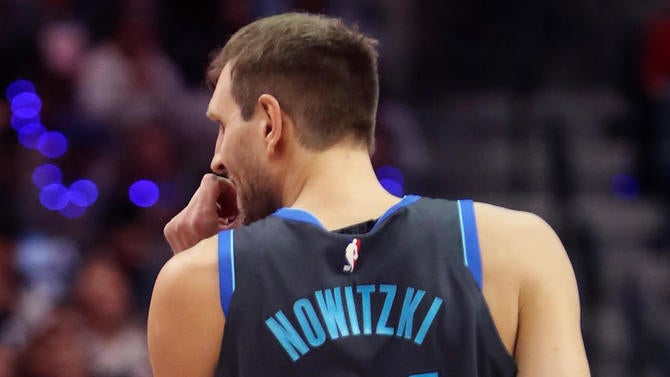
"A little bit more 'I'm going to cut your head off'"
Nowitzki was fortunate to start his career playing for Don Nelson, a forward-thinking coach who didn't try to turn him into a traditional big man. It helped, too, to have Nash and Michael Finley at his side. Nowitzki's talent and work ethic were undeniable, and the soft touch on his jumper stood out to anyone who was paying attention. He needed time, though, to develop into the Mavericks' undisputed franchise player, and there is some debate about how clear it was that he would.
Mark Cuban, Mavericks owner, 2000-present: I didn't know how good he would be. Had no idea.
Greg Buckner: After his rookie year, they'd take us all, us young guys, and we do summer league. We do summer league that year in Utah and L.A., I think it was back then, and he f---ing put on a show. I mean, he put on a show. He even turned me into a scorer, and I couldn't score to save my life. He just put on a show. He was clearly the best young player out there. It wasn't even close. And then after you see that success in those two, three weeks that we had in summer league, that next year, it was just too easy for him. He just became confident.
Adrian Griffin, Mavericks wing, 2001-2003; 2005-2006: His second year, I was with the Celtics and we were playing Dallas and I had never heard of Dirk Nowitzki before. So, I switched on him, BANG! Just drilled a 3. And I was like, that's probably just a glitch, probably just a mistake, he probably got lucky on that. Came right back down, I got right back on him again in transition, BANG! Rick Pitino is now giving me an earful. He was cussing me out, calling me every name. "You gotta get up and play him!" That's the first time that I was introduced to Dirk Nowitzki, and then I became a fan from afar.
Donnie Nelson: Dirk just needed time to physically, mentally mature, and I think that's where a guy like Michael Finley and Steve, Holger certainly, my dad and the Dallas community really made him feel welcome in the early days.
Adrian Griffin: I was there to witness almost a total transformation of his mental approach, mental game. The first stint when I was there, we had Dirk Nowitzki, Steve Nash, Michael Finley, and I can recall at the end of the game, when we needed a basket or a certain play, they all three would defer to each other like you go ahead and take it, or you take it. My second stint, Dirk was like give me the effing ball. That was the difference.
Greg Buckner: I mean, obviously Dirk never wanted the attention. He's never going to be the guy that is going to say, "Yeah, it was about me," or whatever. But Dirk always knew he was going to be the franchise guy. And Dirk always knew after that second year, it was Dirk's show. It was not Nash's show, it was not Finley's show, it was not Van Exel's show. It was Dirk's show. Dirk was the franchise from his third year on. And let's not get that messed up. And we all knew that. We all knew who the man was.
Calvin Booth, Mavericks center, 2000-2001; 2004-2005: It was a legitimate Big 3. I think all three of those guys were equally important to us winning. Dirk and Finley were usually going to be the leading scorers, Steve obviously did what he did to help everybody else out and make shots. I think by the time I got there, I got there midseason, I think by that time he's starting to get his footing and he's having more big games. He ended up making third team All-NBA that year.
Mark Cuban: He had Nash and Fin working with him continuously. Encouraging him. Plus we started winning and he knew he was the best player on the team. If you heard all the shit he would talk, you would know he was OK with growing into the role of the best player and a leader.
Al Whitley: When Steve left, as hard as that was for both of them and for all of us, it actually did help Dirk's career and kind of pushed him into that kind of leadership role that he wasn't necessarily comfortable with before Steve left.
Nick Van Exel: Once he got along in his career, he started to see how good he was and how good he could become and he started to take his approach to another level. And one thing about him is he's so cool off the court, but on the court he got kind of a fire inside of him to where he was a little bit different. He was a little bit nastier. He was a little bit more I'm going to cut your head off.
Adrian Griffin: He was always cool and calm, especially my second time with him. That's the confidence that you have. It's almost like the Jordans and the Kobe Bryants. You just have this aura that we can't lose or we're never out of a game. We're down 20 in the fourth, so what? We got Dirk Nowitzki. That's how you always felt. You always had a chance. He'd come in and bang three 3s in a row, and now you're back in it and then everyone's juices are going. He could just have that impact. He's a game-changer. In a couple possessions, you put the ball in his hands and he'd just work magic.
"I used to call him the black German"
In the 2006 playoffs, weeks before the Mavericks lost to the Miami Heat in the NBA Finals, Nowitzki revealed that, in order to relieve pressure at the free throw line, he liked to sing to himself under his breath. His song of choice at the time was David Hasselhoff's "Looking for Freedom," which was a No. 1 hit in Germany when Nowitzki was 10 years old. There is more, however, to Nowitzki's musical stylings than the work of former Baywatch stars.
Nowitzki's coach and mentor, Holger Geschwindner, wanted him to see basketball as a dance. In one of 2014 documentary The Perfect Shot's more memorable scenes, Geschwindner's former teammate Ernest Butler plays saxophone during a training session as a bunch of German players try move and dribble a ball to the rhythm. Butler and his saxophone are in the foreground, with a basketball hoop on the gym wall behind him -- a perfect shot, indeed.
Geschwindner bought Nowitzki a sax of his own for Christmas and, after Terry Porter's elbow cost him a front tooth in the 2001 playoffs, Nowitzki lamented that he couldn't play it like he wanted to in the summer. Just before the Outback portion of his head-clearing trip to Australia after the top-seeded Mavs lost to the eighth-seeded Warriors in the first round in 2007, the reigning MVP and Geschwindner hit the Sydney Opera House for Beethoven's Fourth and Seventh symphonies.
Anyone who knows Nowitzki, though, is aware that, for more than two decades, he has fancied himself a rapper.
Greg Buckner: Gary Trent took him under his wing and played hip-hop music for him. I mean, Dirk is the biggest hip-hop junkie in the world at this time. He's quoting all hip-hop songs and stuff like that.
Nick Van Exel: He was just real goofy. Real goofy. Singing songs. Trying to sing the rap songs. I used to call him the black German.
Justin Anderson, Mavericks wing, 2015-2017: You can tell he hung out with a lot of black guys when he first came into the league, and I asked him about it because, like, all his slang, he's on point with it. Like, "Nahmsaying?" He says all types of things. Gary Trent was his vet, so he was like, "Man, I had all the OGs with me." Those are all usually the funny things.
Greg Buckner: Nash is obviously from Canada and has a different-type background. Michael Finley is from Chicago. Gary Trent is from the Midwest. I'm from the South in Kentucky. We had Cedric Ceballos from L.A. He's just a sponge, soaking all this stuff in, and it created, as we say, a monster, boy, because he could hit you with all kinds of things from all walks of life. It really rounded him out to be a great jokester in all different realms of life.
Seth Curry, Mavericks guard, 2016-18: The guy's from Germany. He doesn't really have an accent as much anymore, but he's in touch with the culture. He knows the music, knows the movies, knows that sense of humor. It's always funnier when it comes from Dirk.
Adrian Griffin, Mavericks wing, 2001-2003; 2005-2006: What people probably don't know is that Dirk and Steve used to bring their guitars in sometimes. They would play, try to teach each other how to play the guitar. I don't know how it ended. Maybe they could be Van Halen by now if they stuck with it. They were in the early years.
Greg Buckner: We all hung out together. We all went to Cedric Ceballos' house and hung out played cards and played dominos. Dirk then was playing the guitar. The funny thing about it, they would bring those guitars on the road and work at it.
Al Whitley: The instruments, the guitar, the saxophone, stuff like that, his mentor, Holger, has always encouraged him to learn different things outside of basketball. To advance your career and be the best you can possibly be, you have to expand your mind in certain things outside of the game of basketball. And musically, Holger is a big advocate of learning instruments helps you do that. I think that's how that all originated.
Adrian Griffin: He was learning. You wouldn't book him for a gig just yet back then, but they say 10,000 hours.
Nick Van Exel: It's probably our first road trip we go on, and I see my phone is lit up. You know, the blinking light. I'm like damn, who in the hell? I'm thinking maybe it's the front desk or something leaving a message. So I check it, and next thing you know, it's Dirk on there singing a damn song, playing a guitar. But I guess that was his way of welcoming me, breaking me in and whatever.
Al Whitley: He just sings and jokes around all the time. Sometimes even he'll rap in German just to keep the mood light for the guys. Half the songs he sings, if it's not hip-hop, a lot of our players, especially our younger players, have no idea who it is. It could be a classic rock band, the Rolling Stones, who Dirk loves, and these guys have no idea.
Ian Mahinmi, Mavericks center, 2010-2012: You see him sing and rap. And this is before important games.
Chandler Parsons, Mavericks forward, 2014-16: Tennis, he's unbelievable. His serve is a pro-level serve. Obviously he doesn't have the agility anymore and the foot speed, but his serve is next level. Singing, dancing, anything of that level, no shot. No good there. He's a Hall of Fame basketball player, not a dancer or a singer.
Dennis Smith Jr., Mavericks guard, 2017-19: It's horrible. The confidence level is high, but the tone is trash.
Nick Van Exel: I was just like, you know, I'm glad you chose basketball because that other path probably wouldn't have worked out for you.
Mark Cuban: Mick Jagger is lucky Dirk took up basketball.
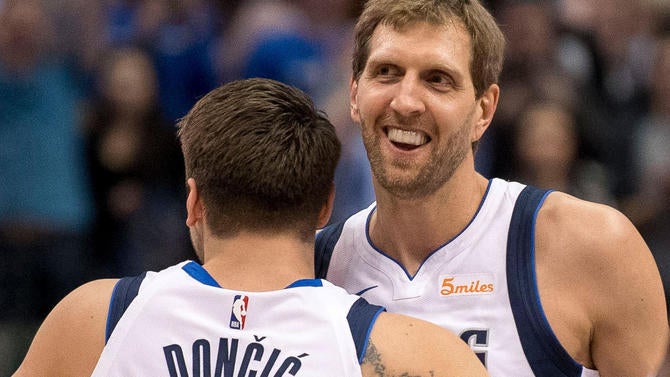
"Man, how is he getting past people?"
The Mavs call it "the flamingo." You probably just call it the Dirk. It's the one-legged fadeaway jump shot that is to Nowitzki what the skyhook is to Kareem Abdul-Jabbar. "That's a shot that terrified a lot of opponents because you didn't know when it was coming and you knew you couldn't block it anyway," Warriors star Kevin Durant said.
Nowitzki vexed opposing coaches because normal rules didn't apply to him. He was a master at making contested midrange shots, precisely the kind of looks that defenses were designed to allow. A simple pick-and-pop inspired nightmares.
DeAndre Jordan, Mavericks center, 2018-19: He's a monster, man. He could drive and get to the basket easily. You couldn't really block his shot because he fades away, he shoots with a high arc and he gets that knee up there. And for me, I was a young player, playing against him, so I wanted to really guard him hard or try to block his shot or do something that took him out of his game. But more times than not, it did not work.
Marc Gasol: He's a right-handed guy, high release, high arc, so you gotta be really close to contest that. Then if you take away the right hand -- which, he rarely drove right hand, but you still gotta honor the drive -- you cut him off, he's going to back to a little spin move, one-leg fadeaway. You're not getting to that shot. Everything was a counter to a deadly weapon, which was his jump shot.
Antawn Jamison, Mavericks forward, 2003-2004: I felt like the best defense was I had to make him work on the defensive end and try to score against him.
Mike Procopio, Mavericks director of player development, 2013-present: You watch these guys with these Instagram workouts in the summer that are bogus, like dribbling seven balls and jumping over shopping carts to get to a shot. Some guy's got a 40-foot pole that he's gotta shoot over like he's in the MTV Rock N' Jock game. Like, that's not him. He just does all these simple shots. He just knows his kill spots on the floor and he knows where he has to get to, and he gets to 'em.
Yogi Ferrell, Mavericks guard, 2016-2018: I've never seen him do a between-the-legs or a behind-the-back dribble ever. Probably not even a crossover.
Jae Crowder, Mavericks forward, 2012-2014: Really, how are you going to guard the pick-and-roll with him popping? If you hedge, he's big enough and tall enough to get the shot off. If you switch it, he sees right over the top of the smaller defender. When he's got it going, it's tough to stop him. It's tough to put the fire out. Obviously.
Vince Carter, Mavericks wing, 2011-2014: You look at him, he's the slowest guy out there, but yet you can't stay in front of him. He knew who he was and how to be effective, man. I tell you, in his day, he was a force to be reckoned with as far as, like, you sit him, you post him up at that free throw line, and he's just a smart player. He knew how to make defenses pay. You just look at it, like, man, how is he getting past people? But you have to respect the great shooter that he is. He knew how to get buckets. Obviously, 31,000 points speaks for itself.
Elton Brand, Mavericks center, 2012-13: I remember one game against Carlos Boozer, I know Boozer wants to go left. I'm screaming at Dirk, at Dirty, "Send him right, send him right!" Boozer goes left and scores. And then scores again. And I'm frustrated. I'm just like, "Goddamn, Dirty! Send him right!" And then Dirk hits two dagger 3s to win the game. I go back and apologize: "Look, you never have to play defense again, man."
Mike Procopio: He's not just like a hired assassin, hired gun who's going to get you 35. He's smart, he can pass. Back in his day -- before electricity -- he could actually get off the floor and get by guys. You watch him, I don't think he wants you to know this, but the reason why he invented the fadeaway is because Bill Russell kept on blocking his shot at The Garden. He needed his shot to go over him.
Ian Mahinmi: You can see KD now, Porzingis, all these 6-11, 7-footers, 7-foot-1 players, they all watched Dirk. They all watched Dirk shooting 3s and putting it on the floor and having this high release. This is Dirk. Ain't nobody who was doing it like that before him. From time to time when we have talks, especially with the younger generation, and we brought up the name Dirk and they're so quick to be like, "Uhhh." Like, no, man. Nah. Dirk is like that. You just haven't seen it. Do your research. Look some tape up. The man is great.
"The holy grail of his career"
In Nelson's view, Nowitzki's game had reached "a whole different stratosphere" by the time he returned to "the scene of the crime." That would be the 2011 NBA Finals, again meeting the Heat. Surrounded by veterans who knew they might never get back to the Finals, Nowitzki upstaged LeBron James, Dwyane Wade and Chris Bosh. Then-Mavericks guard Jason Terry said it was hard to describe how he owed Nowitzki for the championship ring, but called it "phenomenal" to reach the pinnacle alongside him. Fans feel the same way.
"The people of this city view Dirk and their relationship with Dirk as a precious relationship," Dallas coach Rick Carlisle said. "It's been based upon all the right things. It's been based upon a singular vision to provide the ultimate moment, which came to fruition in the form of a championship in 2011."
Carlisle made sure to cite Nowitzki's "amazing sense of loyalty and giving" and mention the "untold of millions of dollars" Nowitzki sacrificed in free agency, which allowed the Mavs to sign Tyson Chandler. Without the addition of Chandler, there would have been no title, no parade and no incredible photos of Nowitzki wearing Ian Mahinmi's glasses at Miami nightclub LIV, where Cuban spent a reported $110,000 in four hours.
Donnie Nelson: Dirk felt (in 2006) not only did he let down people in the locker room, let down people in Dallas, but also around the globe. I mean, he was carrying a baton that has never been carried before.
Al Whitley: Disappointment and devastation. We did sit in the locker room for many, many hours till the wee hours of the morning. And I know it still hurts him. But if you look back, in order to reach the top of the mountain, you gotta go through peaks and valleys. And at the time, it felt like we got punched as hard as you can get punched, but in the end, I think it was meant to be along the journey to get to where we got to in 2011. The sun came up the next day -- we watched it -- and it is what it is.
Rick Carlisle, Mavericks coach, 2008-present: The only thing he's ever cared about is winning. In the 11 years that I've known him, that's the only thing. He was a 29-year-old guy about to become 30 when I got the job here, and the championship had eluded them in 2006. It was very painful.
Donnie Nelson: It's like somebody ripped your heart out.
Rick Carlisle: That was his only goal. And it wasn't just a goal that he had for himself. It was a goal that he had for the city of Dallas. And a lot of that had to do with his feelings about the fans here and of course his feelings about Mark Cuban. That was the only focus.
Donnie Nelson: You hear things like, "You'll never be able to win a championship with someone with a European mentality, they don't understand our game, there's no defense, people won't follow that kind of a leader." Blah blah blah, this and that. You hear everything. And when you fail, those things, whether they're real or not, become true in people's minds. And so when we're sitting there, about to stick a flag into Mount Everest in our first Finals run, and that cup is literally ripped from our arms, then you hear all of the naysayers.
Jason Terry, Mavericks guard, 2004-2012: Dirk and I had a very special relationship. You gotta understand, when I was traded to Dallas and then Steve Nash departed Dallas, Steve Nash was Dirk's best friend. He was the teammate that he had played with that they had that sort of relationship and chemistry. When I was brought in to replace Nash, people thought that relationship would kind of happen, it would be automatic. But we had to let that relationship grow organically, and we had to go through it -- trials and tribulations, adversity, losing in the playoffs, that sort of thing -- for our relationship to develop and for it to evolve. Besides Stockton and Malone, I say we had the best two-man game ever in NBA history.
Rick Carlisle: The amount of emotion that overcame him at the end of Game 6 on June 12, 2011 was amazing. He had to leave the court, he went back to the locker room just to try to collect himself. There were tears in his eyes. You look into the stands, if you looked up into the stands and saw Holger Geschwindner, there were tears in his eyes as well. These guys had basically captured the holy grail of his career, and it was an amazing moment that will never be duplicated.
Al Whitley: All the hard work and the blood, sweat and tears that he put into doing that, to see that come to life was one of the greatest moments of my life.
Donnie Nelson: It literally took me probably about two weeks of waking up, "Honey, that wasn't a dream, right? We've got the trophy, right?" It's like, "Yeah, remember you had the parade?"
Ian Mahinmi: Those glasses are not prescribed glasses. They're fake glasses. They're just a fashion statement, whatever. And then after we won, he was like, "Man, come on, man, let me see what I can do with this." And I remember he snatched them from me and he put them on. Little stuff like that, me as a young kid, this made me feel so special. That's just Dirk right there. He's that type of guy, man. He made fun of me wearing those glasses so many times. Almost every single day. And then here we go, Finals, we win and he's wearing it. It don't get no better than that.
Al Whitley: I was two seats down from him. It was hilarious. I don't even think he could see through them. The drinks were flowing so much at that point. But I actually thought he pulled the look off pretty good.
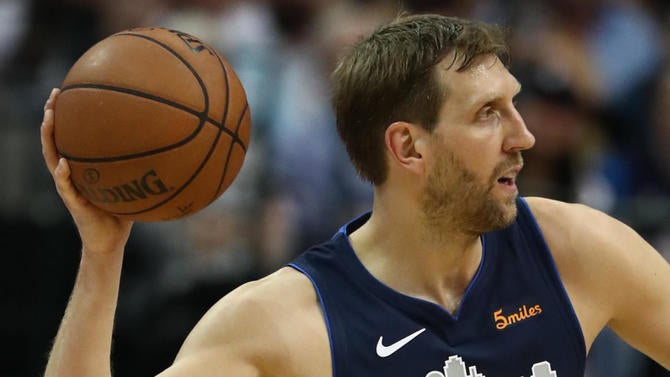
"We go at it in QuizUp"
"He trolls you," Dallas rookie Jalen Brunson said. "But also, like, he takes jokes, too."
Players new to the Mavericks do not always know about Nowitzki's trash talk, and then they inevitably find themselves on the receiving end of it during a scrimmage. Cuban's favorite Dirkisms are "Happy Birthday," "What a circus" and the immortal "He's a burger."
No one is more in tune with Nowitzki in this regard than Mike Procopio, the Mavs' head of player development. Procopio is a man who is willing to spend an hour and a half editing a video for the sole purpose of trolling the face of the franchise.
"Instead of The Perfect Shot, it was called 'The Perfect Limp,'" Procopio said. "And it was about all his follies on the court, falling down or getting shaken up on a pick-and-roll. I just sent it out on the group chat with all the players and stuff. And he's cool with it. He's laughing."
The day after our interview, Procopio followed up via text message. "I was going to stop but this old f--- just made fun of me again," he wrote. He had four more things to say about Nowitzki:
- He's so old that his calcium deposits have calcium deposits.
- He sometimes says I can't wait to retire. I tell him statistically he retired in 2014.
- National Geographic is doing a ranking, who's the least mobile: The Titanic, Stonehenge or him. He came in fourth.
- I tell his legs every day what the late, great Jim Valvano said: Survive and advance.
Wesley Matthews, Dallas Mavericks wing, 2015-2019: Obviously he's getting older, but he's still as good of a shit-talker as ever.
Zaza Pachulia, Mavericks center, 2015-16: I've been following him on social media. First of all, it took him a while to get on social media because he's so slow in everything. I saw a couple of tweets of his, clowning his teammates, and you could tell the guy has humor. But I didn't know that he had that much humor till I became his teammate. The guy is nonstop. Nonstop, and I mean that.
Greg Buckner: "What up, Work?" He says that to everybody. When he says that to you, you know you've been around Dirk, you know you've been one of his teammates and you've had a great time with him and you've been on his coattails, riding the ride, enjoying the show and watching him do his thing. It was really big when we first got in. Burger is almost disrespectful. When somebody calls you a burger, that's not a good thing. It's not like a good In-N-Out Burger. It's a bad thing. Burger is about him joking with you, telling you that you ain't shit.
Jae Crowder: If he calls you a burger, it feels like you're not on his level.
Dennis Smith Jr.: Somebody playing trash or if somebody's trash, he'll call 'em a burger.
Elton Brand: He'll call you a burger. I'm trying to defend him in practice and he'll be like, "Too little! E.B.'s too little!" Because, you know, he's 7-foot and I'm 6-7 3/4. He just talks trash. It's just love, though.
Greg Buckner: He was a burger on defense.
Mike Procopio: When he gets subbed out, he will look at my outfit and destroy what I'm wearing and I'll politely tell him that his defensive plus-minus reads like the Dow did in the stock market crash of 1929.
Ian Mahinmi: Let's say like during the game I would miss a bad shot. So it was for sure the next day at practice or shootaround, he'd look at me and he'd do the exact same shot. But he'd overexaggerate.
Mike Procopio: [Dirk and Doncic] are two clowns. They clown on each other. Dirk clowns on his weight and just sort of him butchering the English language. He'll just go at Dirk about how old he is. It's cool 'cause those guys are different because of obviously the age and what they've grown up with, but they're the same in the sense that they're competitive as hell. I mean, competitive as hell. But they're funny as hell. They're good to be around. Teammates love them. It's awesome to watch those guys. You could go 0-82 and you'd still have fun going to work every day because of those two guys.
Ian Mahinmi: Dirk will crack a joke at the most random time and he'll relax the atmosphere. When your leader is capable of taking a joke and making fun of yourself and laughing out loud, it's kind of like OK, this guy is human, this guy is actually just like me.
Mike Procopio: Right now, it's our endless games of QuizUp on our apps. 'Cause we talk trash to each other all night. We'll play all night. We'll go at it about Mavericks history, NBA All-Star Game history and 90s music. And every time somebody wins, we screenshot the scoreboard and we say something pretty outlandish about the other person. After a game, after he chips off the iceberg that sank the Titanic and soaks his feet in it, and all his battered-out joints, and when he's out of it, he's on the bus, I know that I'll get a text on my phone that he challenged me in some game. We were like 78-79, we were like neck-and-neck for a while and then I went on a cold streak. Because we're playing Dallas Mavericks history. The f---ing guy, half the answers are about him anyway. How the f--- do I know how many offensive rebounds he had in his career? I thought Eric Montross was the leader.
Nick Van Exel: He's still trying to play, and I played with him in 2003, 2002, and I'm sitting behind the bench talking shit to him. So we were playing the last game in Dallas. He was at the free throw line. I said, "Dirk, man, you might as well come on sit back here with me, man. Let this shit go." He looked at me and starts laughing.
Mike Procopio: Our current score on QuizUp is 106-80 as of now. I hung in there for a while but, like Dirty's joints and legs, I'm on a tremendous downward spiral.
"You'd think he was the 15th guy"
If you really want to know what an NBA player is like, try to find out how he treats team staff. Whitley, who was Dallas' longtime equipment manager before his promotion this season, said that Nowitzki has "the biggest heart of any person of his stature that I've ever been around." He added that Nowitzki has "no diva in him" -- he never even asked for new socks, shirts and shoes.
Ask teammates about Nowitzki, and many of them will tell you it has been an honor to play with him. Mavericks center Dwight Powell is one of them, and he said he has been inspired by Nowitzki quietly finding ways to help the community and change lives in Dallas. Ex-Mavs guard Darren Collison will never forget watching Nowitzki slowly walk through a crowded airport, signing autograph after autograph, brushing nobody off. According to Whitley, countless players have told him over the years that they "never thought he was like this" because of his intensity on the court.
One of the peculiarities about playing until you're 40 is that you end up sharing the court with people who grew up cheering for you. "I've got his jersey," Joe Ingles said. "Only one I've got." When Ingles and Nowitzki got in a scuffle, the Utah Jazz forward "felt bad 'cause I really like him."
Justin Anderson: The team that I would always choose on 2K, the poster that was on my wall, the jersey that I begged mom to buy was Dirk's. Coming to the league, being drafted by the Mavericks was obviously a surreal moment to me. I remember when I first got to see him in the locker room, just being able to kick it with him.
Chandler Parsons: We would always have a group that we would go to get dinner on the road. I remember the girl I was dating at the time I played in Dallas was German, so we'd always go to his house and we'd play tennis or we'd just hang out. Just little things like that that I would never think I'd get the chance to do with one of the greats. And it's just crazy how the world works. It started off with idolizing this guy and now I would consider him a close friend. It's crazy that basketball brought me to someone I looked up to as a role model my whole life.
Ryan Broekhoff, Mavericks forward, 2018-present: When I started basketball, I was like, "I want to be like Dirk." You'd go into the backyard or play against friends and throw up the one-legged fadeaways. It didn't go in too much, but you'd yell, "Dirk!"
Doug McDermott, Mavericks wing, 2018-2018: When I was in college, I kind of started shooting those fadeaways because of him. I watched him in the Finals that year against LeBron. I posted a lot in college, so I added it to my game and it ended up being really huge for me.
Ryan Broekhoff: It's come up in a couple of interviews. Whether he's paid much attention to it or not is a different story. I haven't gone up to him and just gone, "I was a big fan," all this sort of stuff. When I first came in, I was like, "Oh, wow, there's Dirk walking in." Now it's, "Hey, Dirk, how you doing? How's your day?" I know him as a person and he's such a down-to-earth, funny, warm character that it made it easy for me to not just see him as an idol growing up but a teammate and, now, friend.
Doug McDermott: I didn't want to be a fanboy around him. He doesn't know how big of a fan I am.
Elton Brand: It was refreshing because you hear a lot of stories about other superstars, and you go to the Mavericks and the initial team dinner is at his house. His wife is setting up the food. It's like a normal, just everyday teammate. You wouldn't think he was the Hall of Famer, you'd think he was the 15th guy just trying to hang on at times, with his demeanor.
Dennis Smith Jr.: He's willing to allow you into that aspect of life, letting you know how he is. He even told me that I need to go by his house and start babysitting his kids. He told me that my rookie year.
Al Whitley: He's a superstar player that's always thinking about the staff and enjoys hanging out with them outside of basketball. Some of his closest friends are the Mavs staff. I mean, we've grown up with him.
Rick Carlisle: He's not high-maintenance. He's not needy. He's a giver, not a taker. And you gotta be real careful because all those qualities point to a guy that's easy to take for granted. My level of respect for him is so high, and my understanding for how special he is both as a person and as a player is so high that I refuse to take that guy for granted.
Adrian Griffin: Dirk Nowitzki was very content about being Dirk Nowitzki. He didn't feel he had to live up to any persona. He didn't feel he had to be a prima donna or be out in the media and put on a certain image. He was cool with being Dirk, and that's what made him so special. He'd come into practice with jeans on an a T-shirt. On the court, he was a killer. Off the court, he was a gentle giant. I don't know if you'll ever find a Dirk Nowitzki ever again.
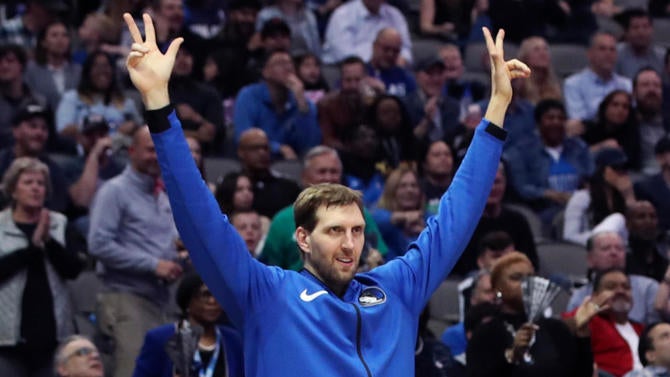
"Dude, you're 38, are you going to be able to walk tomorrow?"
When Avery Johnson coached the Mavericks, he had to resort to punishments. "It would be like, 'Hey, tomorrow's off; if anybody comes in, they're getting fined," ex-Mavs center Calvin Booth said. Johnson said it to the whole team, but the message was for Nowitzki, who did not seem to respect the concept of an off-day.
This is not to say that his extreme commitment to his routine is a problem. "No one sets a better example than Dirk Nowitzki," Nelson said, speaking reverentially about the way his game evolved under the tutelage of Geschwindner. The two of them wanted to add to what they called his "toolbox" every summer, and Nelson still sounds mystified by the way Nowitzki improved as a rebounder early in his career.
"Dirk is like a son to all of us, but particularly Holger who, really, in a lot of respects, birthed him from a basketball perspective," Nelson said. "He was working with him back in the day when he literally was this kid that was just a little colt on the court, trying to figure out life. He's been his agent, he's been his mentor, he's been his motivation, he's been, really, everything from soup to nuts. And Holger's skill set and his ingenuity perfectly matched up, I think, with Dirk. It was one of these really cool time-and-place happenstances where these two planets came together."
Nowitzki put the Mavericks on his shoulders, but loud, vocal leadership was never his thing. "He showed me the ropes, he showed me without telling me," former Dallas wing Justin Anderson said. Anderson is one of many ex-Mavs who said they made a point of doing shooting drills with him and watching what he was doing. When Nowitzki went to the cold tub, Anderson followed him to the cold tub. When Anderson noticed Nowitzki was eating before treatment, he decided to eat before treatment.
"He taught me so much about the game, whether it's taking care of your body, how much water he drinks," Anderson said."I mean, he drinks an insane amount of water. Every time I saw him he had a big glass bottle of Mountain Valley water with him."
Elton Brand: I saw Holger, his coach, come in from Germany, and I'd get shots up at night and they were there all day and night, working on his form, doing his, like, squatting all the way down to the ground and shooting high-arcing shots.
Ian Mahinmi: I asked Holger to work me out just so I could see it. I worked out a few times with him and his stuff is hard. You get to a point where you master that shit, no wonder why you're a Hall of Famer.
Elton Brand: It was fascinating, watching him do like squats and not even shoot the ball. And bear crawls.
DeAndre Jordan: Some of it is very unorthodox, but, shit, I mean, if it works for you, it works for you. Obviously it has been proven to work over 21 seasons. We all could take a page out of his book.
Seth Curry: It's about routine. It's about what you do every day. If you do something every single day, you can master it, you can figure out what works for you. Even today, you see guys like KD and Steph take some of those things they've seen Dirk do with Holger and apply it to their workouts, like getting extra low, shooting it super high arc. He definitely changed the game in the way people practiced shooting.
Donnie Nelson: We would give Dirk and Holger things that they needed to work on over the course of the summer, and when the season was over, it was almost like they went right back to Würzburg and got in that gym. And by the time training camp came around, not only did he have it, but he had it mastered.
Jason Terry: To watch Dirk work, to watch him prepare the way he did, it made me a better professional and a better player. There was many nights where I would be on one end of the court, he would be on the other and he would be working on his craft. And I would just peek down to the other end and just watch him work and what he was doing and with the efficiency that he was doing it with. That routine alone, I implemented and it gave me the longevity that I've had to this day, to be able to play 19 years. Had I not been Dirk Nowitzki's teammate and been able to witness that greatness every single day and sit by him in the locker room during my time in Dallas, I don't think I would have played as long.
Donnie Nelson: In all the years that I've been here, we haven't had a single guy that's outworked him. We get rookies that say, "Oh yeah I'll be here every day that Dirk's here, I'll work harder," and this and that. Yeah, that lasts about a week.
Harrison Barnes, Mavericks forward, 2016-2019: He'd always brag. He'd be like, "I heard you were a hard worker." I'm like, "Yeah, likewise. Hey, if you want to get in the gym, let me know." And he was coming back and he's in the gym for like an hour and a half, two hours after practice. I'm like, "Dude, you're 38, are you going to be able to walk tomorrow?"
Ian Mahinmi: You get on the tip of your finger when you do your pushups -- Dirk is the first guy that I actually saw doing that type of pushup. So one day I was looking at him, and he was like, "Man, what are you looking at me for? Get down with me and let's do a series." I started that 'cause of him.
Chandler Parsons: I'm looking at my free-throw percentage this year, I'm shooting 90 percent. I used the breathing technique that he taught me. I've always breathed out on my free throw. Before he shoots, he breathes in and kind of holds his breath at the line, which I thought was different. Most guys exhale and he said that kind of puts motion through your whole body. It's a little thing like that that I've picked up on that I'm still using today that I would have never learned if I didn't play with him.
Mike Procopio: He just never goes away from what works for him. And I talked to Don Kalkstein, our sports psychologist, and he says, "Pro, he's been doing it for 20 years. The same thing." The same workout with Holger. The jokes are the same. Everything is the same. It's like a Twilight Zone episode, where everybody else is dead but he's still coming in, doing the same thing, like he's talking to mannequins every day. I literally think if you set up 40 mannequins of our staff and he walks by, he'll just say the same thing without even noticing.
"Cut out of a different cloth"
"It's tough to see him like this," Dallas guard J.J. Barea said last month. Nowitzki had just shot 2-for-13 in a blowout loss to the Brooklyn Nets, missing his first nine shots and all seven of his 3-point attempts. The fans at Barclays Center screamed for Dirk and booed other Mavericks when they didn't pass him the ball. Barea knows how much Nowitzki loves to compete. Everyone around him knows that, 21 years in, losses and bad games still get to him.
You don't need to be a longtime teammate to know that this season has been challenging for Nowitzki. He has spoken publicly about the setback that kept him out until mid-December after spending last offseason recovering from ankle surgery. Over the last few years, he has been honest about the frustration that has come with his body no longer being able to keep up with his mind, just like he was honest about his Finals heartbreak.
Nowitzki never pretended to be invincible. He owned his failings, deflected praise and answered questions. According to Cuban, players can learn a lesson from this: "Being humble, open and vulnerable are signs of strength."
Al Whitley: He put in so much work this past summer and was actually feeling really good. The setback was tough to watch. I don't think many people, if any other than himself, could get through that and continue to play on and keep fighting every day at his age and at his stature. It would have been easy to just hang it up and say, "I gave it a go and it just didn't work out." But instead he was the first one at the gym getting treatment, rehabbing, trying to figure it out and get it right 'cause he wanted to come back and play so bad.
Mike Procopio: He's got a lot on his mind. He's hurting. I think if you invested in ice this past couple years, it went up about 300 points in the stock market because we've monopolized it. But the guy's going through some tough times sometimes, so joking around and making the guy smile and laugh is pretty cool.
Greg Buckner: He's Mr. Maverick. The Dallas Mavericks' legacy is all because of Dirk. And a little bit of Mark Cuban, don't get me wrong. But Dirk is the legacy. And he knows this is his baby. You never want to give up your baby. He feels like the Mavericks is his baby, and I think that's why he's grinding and grinding can play as long as he has.
Donnie Nelson: Dirk a number of times could have gone a different direction and said, "Hey listen, let me go finish up with Golden State." Look, he's gotten calls from all the big boys. I mean, anyone that's been in the Finals run -- L.A., Miami, he gets calls from all of those guys. Recruiting calls from some of the best players that have ever played the game: "Hey, come on and join us. We're assured that we'll get to the Finals. We got a shot to get you another ring." Dirk has turned down all of those sirens to stick it out here in Dallas. That's, beyond words, appreciated.
Rick Carlisle: Dirk's a great friend. This is my 11th year. We arrived here in 2008 when my daughter was going into preschool. She's now in eighth grade and my present contract runs through the end of high school for her. I'm well aware that the reason my daughter is going to likely be in the same school for 14 straight years, with pre-K, kindergarten and then grades 1 through 12, is because of Dirk's greatness and all these very unique qualities. He now has a young family with three kids, and he's learning what that's all about. But he and I have been through a lot, and if you look at what's happened with the team since the championship, there's been a lot of upheaval. There's been significant change virtually every year. But he's kept a consistent approach, a positive mindset, a positive bent on the whole thing. And it's made my job lightyears easier than what it could have been.
Donnie Nelson: This is almost like a time warp because you really can't believe this is potentially coming to an end. You can't imagine your life without that person. And it's not like he's leaving forever or anything like that, but you've been so used to having him be the rudder of the franchise for so long, you don't really know how to react to it.
Mike Procopio: I love him. he's a good dude. I'll never admit that to his face. I'll Frank Underwood this thing and just lie and put a spin on it if anyone ever says it, but I love the dude. He's a good guy. He's one of the best. I'm glad I got a chance to spend six years with the guy.
Rick Carlisle: I've been in teams with superstars for decades. I can categorically say that Dirk is cut out of a different cloth. I can also say with the utmost confidence that we will never, ever see a guy in the NBA game quite like him, in terms of his humility, loyalty and all-out level of greatness. The interesting thing about Dirk is the humility and loyalty make it easy to marginalize certain parts of his game and certain huge contributions that he's made to the game. And at the end of the day, that's what makes him the most special.
Donnie Nelson: If San Antonio is the last hoorah, will be his last game, that ironically is where everything started. We're going to be playing right next door to that little gym to where the Hoop Summit was played, that little 5000-person gym. So Dirk's period is going to end literally about 50 yards from where his American Idol moment happened. Ironically, Holger and I, we're going to have a date at the same place that we did however many years ago. If that is in fact the last game, it's ironic serendipity. It's almost like a song.













